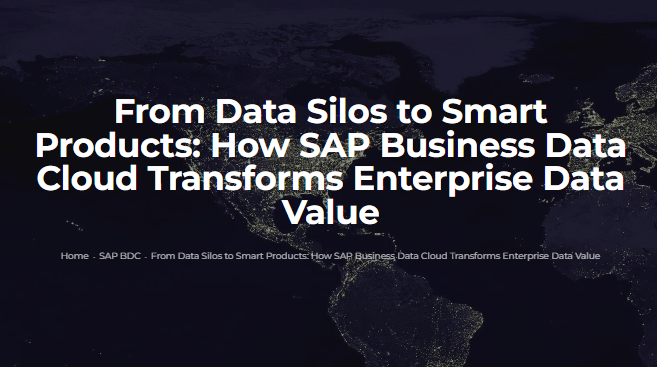SAP Business Data Cloud
What Is SAP Business Data Cloud?
SAP Business Data Cloud (BDC) is a fully-managed SaaS offering that comes with a single URL and a single contract, SAP BDC brings together data activation and extensions, third-party consumption tools, and an open data ecosystem. The solution is a data management solution designed to unify and harmonize data from various sources, enabling seamless integration, governance, and accessibility across an enterprise. It supports a data-driven approach by connecting SAP and non-SAP data, facilitating analytics, AI/ML applications, and business insights. The solution helps organizations break down data silos, ensuring high-quality, trusted data for decision-making while maintaining security and compliance.
Key capabilities include:
- SAP BDC combines the business semantics of SAP Datasphere, the analytics and planning of SAP Analytics Cloud, BW modernization through a lift and shift from SAP BW, and SAP Databricks which will be a fully OEM’d component within SAP BDC.
- Insight apps for advanced analytics and planning with prebuilt applications across all lines of business.
- Generative AI is supported across applications and operations that is reliable, responsible, and relevant.
What Is SAP Business Data Cloud?
SAP Business Data Cloud (BDC) is a fully-managed SaaS offering that comes with a single URL and a single contract, SAP BDC brings together data activation and extensions, third-party consumption tools, and an open data ecosystem. The solution is a data management solution designed to unify and harmonize data from various sources, enabling seamless integration, governance, and accessibility across an enterprise. It supports a data-driven approach by connecting SAP and non-SAP data, facilitating analytics, AI/ML applications, and business insights. The solution helps organizations break down data silos, ensuring high-quality, trusted data for decision-making while maintaining security and compliance.
Key capabilities include:
- SAP BDC combines the business semantics of SAP Datasphere, the analytics and planning of SAP Analytics Cloud, BW modernization through a lift and shift from SAP BW, and SAP Databricks which will be a fully OEM’d component within SAP BDC.
- Insight apps for advanced analytics and planning with prebuilt applications across all lines of business.
- Generative AI is supported across applications and operations that is reliable, responsible, and relevant.
Further Resources for SAPinsiders
SAP Unveils Business Data Cloud: A Unified, AI-Powered Future for Enterprise Data. SAP Business Data Cloud aims to tackle poor data quality and fragmentation in organizations by providing a unified, managed platform for SAP and third-party data, enhancing decision-making through AI-driven insights and automation, while also partnering with Databricks for advanced analytics integration.
SAP Business Data Cloud Unifies Enterprise Data. SAP has announced SAP Business Data Cloud, a new solution that aims to unify SAP and third-party data across an organization. The company sees the offering as an evolution of data, analytics, and planning strategy that addresses the challenges SAP is seeing in the data market today. Some of those hurdles include data silos, the high cost of data and analytics, and a struggle to implement an effective data strategy to support business transformation due to data quality issues and disconnects between IT systems and business applications.
Databricks and SAP Join Forces to Ready Data for AI with SAP Databricks. Databricks has partnered with SAP to create SAP Databricks, a native integration of its Data Intelligence Platform into SAP’s Business Data Cloud, aimed at dismantling data silos and enhancing enterprise data accessibility for AI-driven insights, while addressing longstanding challenges in integrating SAP data with other systems.











